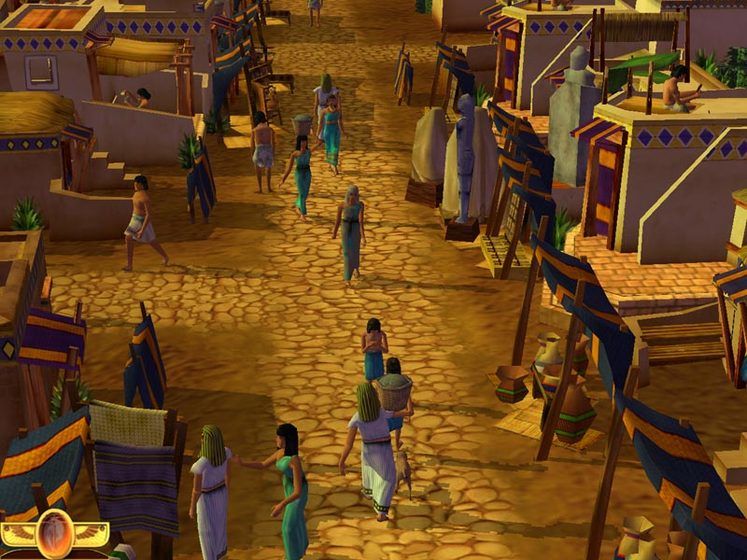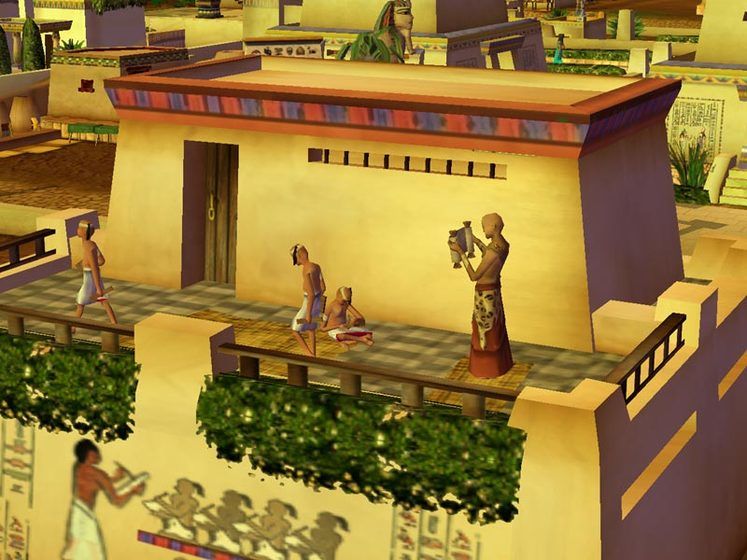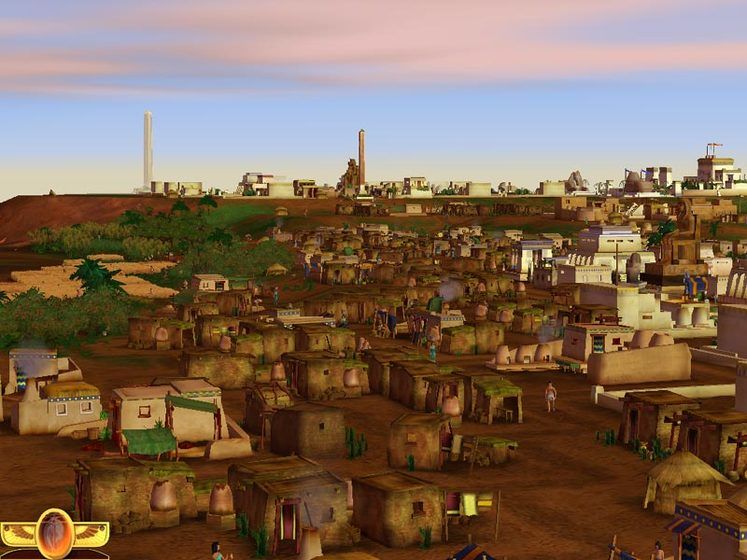Si: Please introduce yourself to our readers.
Chris Beatrice: Sure, I’m Chris Beatrice. I’ve been making games professionally now for about ten or eleven years. I started off with Impressions Games when it was an indie developer and publisher “back in the day.” There I served as art director, creative director, game designer, and eventually headed up the entire studio, before leaving in 2001 to establish my own independent studio, Tilted Mill Entertainment. I’m most well known as the lead designer of the city-building games Pharaoh and Zeus, but I was also creative director and co-designer of Lords of Magic, art director on Caesar II and Lords of the Realm I and II, and I was studio head when we did Caesar III.
Tilted Mill Entertainment is comprised of my personal “dream team” of programmers, artists, designers, development support personnel; project coordinator, musical composer, writer, webmaster, and so on. Assembling this crew to work on a single project for a prolonged period of time is something I always wanted to do, and I’m very grateful it worked out for us. Our company website (www.tiltedmill.com) has a section listing all of our team members, along with their extensive prior game credits.
Tilted Mill Entertainment is comprised of my personal “dream team” of programmers, artists, designers, development support personnel; project coordinator, musical composer, writer, webmaster, and so on. Assembling this crew to work on a single project for a prolonged period of time is something I always wanted to do, and I’m very grateful it worked out for us. Our company website (www.tiltedmill.com) has a section listing all of our team members, along with their extensive prior game credits.
Si: Can you tell us what was the main concept from which you started building this title up? What was your main motivation?
Chris Beatrice: Really it was several things converging at once: first, of course, we really love the genre. More importantly, perhaps, we felt that it had been tremendously under-realized. Like all great games, the city-building genre advanced in big steps at the beginning. However, rather than continuing to reach the pinnacle of its evolution, it sort of got stuck for a lot of years on the last iteration. As great as those games were, really it’s now been four or so years since the last innovation in city-building came out, and there is so much more to be done with the genre.
While every developer on earth seemed to be making RTS clones, and bringing RTS gaming to what is probably its evolutionary peak, no one was really evolving the city-building genre. And that seemed very odd, given that it has a huge cross over appeal to all kinds of gamers and all age groups. So this seemed like a gift from heaven to us – a door just waiting for us to walk through.
Second, the rise of the “life-sim” games (and watching the way a lot of non-hardcore gamers enjoyed them) really reiterated and justified for us what we already knew, and what, with the original city-building games, we had already introduced to strategy games, namely that it’s fun to deal with (seemingly) real people in a game, it’s fun just to build something, and it’s really, really fun to build something and watch people interact with it! That’s entirely separate from the strategy gameplay component. We saw this unique synergy as the natural evolutionary step for building games.
While every developer on earth seemed to be making RTS clones, and bringing RTS gaming to what is probably its evolutionary peak, no one was really evolving the city-building genre. And that seemed very odd, given that it has a huge cross over appeal to all kinds of gamers and all age groups. So this seemed like a gift from heaven to us – a door just waiting for us to walk through.
Second, the rise of the “life-sim” games (and watching the way a lot of non-hardcore gamers enjoyed them) really reiterated and justified for us what we already knew, and what, with the original city-building games, we had already introduced to strategy games, namely that it’s fun to deal with (seemingly) real people in a game, it’s fun just to build something, and it’s really, really fun to build something and watch people interact with it! That’s entirely separate from the strategy gameplay component. We saw this unique synergy as the natural evolutionary step for building games.
Si: In the official description you mention: "...it is the first and only strategy game where citizens who behave like real people are your primary resource.". Can you please explain this.
Chris Beatrice: Well, in most strategy games the “people” or “units” are mindless drones that you don’t care about at all – and they don’t even care about themselves. Sometimes they are really just an abstract representation that one building is communicating with another. This has become accepted in strategy games, and there’s nothing wrong with it, but we felt there was a great opportunity here to introduce a whole other dimension to the play experience.
This basically materializes via two components:
First, people in the game take care of their own needs. You don’t have to feed them or act as a babysitter for them. You don’t select them and order them around, nor do they wander aimlessly. They don’t starve if you fail to feed them, and so on. Sure, you can make their lives a lot better, you can capitalize on their natural inclinations, you can exploit their inherent desire for a better life (and this is really your role in the game), but you don’t need to spoon-feed them. That’s the “they care about themselves” part.
Second, although your success is based 100% on them, and what they can do for you, you have very little direct control over them, and their actions are not 100% predictable. In the aggregate, over the long term, if you do things right, if you are a good leader, then you will succeed. But that’s not the same as being able to focus in on one individual at a moment in time, and know exactly what he or she will do (or being able to tell him/her what to do). The challenges are very much like those of being a real leader, and as a result success is more deeply rewarding than when you’re simply “overcoming the game model.”.
First, people in the game take care of their own needs. You don’t have to feed them or act as a babysitter for them. You don’t select them and order them around, nor do they wander aimlessly. They don’t starve if you fail to feed them, and so on. Sure, you can make their lives a lot better, you can capitalize on their natural inclinations, you can exploit their inherent desire for a better life (and this is really your role in the game), but you don’t need to spoon-feed them. That’s the “they care about themselves” part.
Second, although your success is based 100% on them, and what they can do for you, you have very little direct control over them, and their actions are not 100% predictable. In the aggregate, over the long term, if you do things right, if you are a good leader, then you will succeed. But that’s not the same as being able to focus in on one individual at a moment in time, and know exactly what he or she will do (or being able to tell him/her what to do). The challenges are very much like those of being a real leader, and as a result success is more deeply rewarding than when you’re simply “overcoming the game model.”.
Si: Will the game feature any military units, battles or is it mainly a city builder?
Chris Beatrice: In Children of the Nile you are the most powerful ruler in Egypt, and normally that means you are Pharaoh. In any case, you are always the head of government, and as such the two main things you spend your resources (people and materials) on are monument construction and the military. So the role of the military in the game is as much to serve as a reflection of your status as leader of the most glorious nation in the known world as anything else. But it’s also circular, in that the more glorious your civilization, the more willing its citizens will be to die defending it – and that means all your citizens.
As a result, the military model is deeper than, and different from what’s been done in other city-building games to date. I don’t want to go into a lot of detail about it at this time, but I will say that, in keeping with the rest of the themes in the game, your personal stature as a leader, how you treat your troops, and how well-trained they are, are as important for victory as how many of them you have, and how well equipped they are.
As a result, the military model is deeper than, and different from what’s been done in other city-building games to date. I don’t want to go into a lot of detail about it at this time, but I will say that, in keeping with the rest of the themes in the game, your personal stature as a leader, how you treat your troops, and how well-trained they are, are as important for victory as how many of them you have, and how well equipped they are.
Si: Will it feature any fantasy elements?
Chris Beatrice: As I’m sure everyone knows, the Egyptians were preoccupied, even obsessed with death and the afterlife. Because the “hearts and minds” of your people are at the center of the game dynamic, their beliefs permeate the entire game. The Egyptian gods play an important role in the game too, but not in the way most people are used to. More on that later.
Si: How complex are you aiming it to be? Speaking of micro-management.
Chris Beatrice: It’s very difficult to respond to this question using the standard terminology. In the past, for example, we would never want to say a game was “complex”, because to a lot of non-hardcore gamers that meant “intimidating” or “boring micromanagement.” We also wouldn’t want to say a game was “simple”, because that meant “not challenging” or maybe “no replay.” Well Children of the Nile is complex, because, for one thing, people are complicated! For another, going all the way back to the first question, one of the most challenging areas in developing this game – actually the most challenging area – was in merging strategy game and society sim (or people sim). I guess that is to be expected, since it is what is very unique about this game. I could put it this way: what the game does is very complex, but what you do is very simple.
The idea is that, though human behavior and large cities in general are complex and organic, it all makes sense to you as another human being. And, given that people take care of themselves, you never need to micromanage them, yet you do have access to a lot of detailed information about them and the city if you want it. Some players will. It’s sort of like if you were a real mayor or king, sure, you could go knock on everyone’s door and see what’s in their cupboard, but do you need to? Maybe sometimes, maybe a few of them… maybe that’s your play style… maybe it’s informative for you to sample a couple of households, etc. Like a real ruler, you will focus in on things that are more important to your needs at the given time, or closer to your interests in general. Because you’re dealing with an organic model, it is difficult or even impossible to identify and achieve “perfection”, but if you’re one of those players who likes to micromanage – go to town! (sorry for the pun).
The idea is that, though human behavior and large cities in general are complex and organic, it all makes sense to you as another human being. And, given that people take care of themselves, you never need to micromanage them, yet you do have access to a lot of detailed information about them and the city if you want it. Some players will. It’s sort of like if you were a real mayor or king, sure, you could go knock on everyone’s door and see what’s in their cupboard, but do you need to? Maybe sometimes, maybe a few of them… maybe that’s your play style… maybe it’s informative for you to sample a couple of households, etc. Like a real ruler, you will focus in on things that are more important to your needs at the given time, or closer to your interests in general. Because you’re dealing with an organic model, it is difficult or even impossible to identify and achieve “perfection”, but if you’re one of those players who likes to micromanage – go to town! (sorry for the pun).
Si: Release date?
Si: Thank you for your time. If you feel you would like to add something please do so.
Chris Beatrice: Check our company site periodically for updates. In three or four weeks we’re going to launch the official Children of the Nile website.








